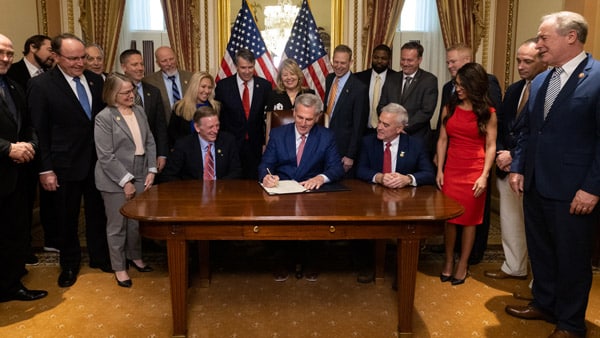
Dr. Sanjay Gupta: A New Way to Heal
Doctors have long prescribed pills and procedures. But for some people, that isn’t enough. Sanjay sits down with Julia Hotz, author of The Connection Cure, to explore the…
Thought Leader: Sanjay Gupta

With this week’s bipartisan passage of H.R. 1, the Lower Energy Cost Act, an amazing pattern has developed in the new Republican-led House. It is increasingly a bipartisan majority that is passing bills the American people support.
In fact, Democrats have supported 37 of the first 43 bills that Speaker Kevin McCarthy has gotten through the House. That means 86 percent of House activity has been bipartisan. Democrats have cast 4,701 votes for these bills.
As I wrote early this month, the new, Republican-led Congress is continuing to be dramatically different from the Nancy Pelosi-led House of the last two Congresses.
Pelosi was using iron discipline (and considerable fear of her power) to pass extremist legislation with strictly Democrat votes. She was effective in holding together her narrow majority (until the election) but the Democrats’ Big Government Socialist bills were so full of extreme positions she could rarely get any Republican votes.
By contrast, Speaker McCarthy has been bringing up legislation which is widely supported by the American people.
These have been popular issues such as the creation of a special committee on the threat from the Chinese Communist Party and blocking China’s access to the American Strategic Petroleum Reserve. The McCarthy-led House has overruled the District of Columbia City Council’s pro-crime bill and its effort to allow non-citizens to vote in DC elections. (The crime bill issue was so popular it swept through the Democrat-led Senate and was signed by President Joe Biden to the anger of the extreme, pro-crime Democrats).
Without the disciplined pressure from the Pelosi machine, a growing number of Democrats are finding it easier to vote with their constituents and support popular ideas – even if they are coming from the Republican majority. In fact, there are 10 Democrats who have voted for Republican bills 65 percent of the time or more.
As time goes on, and more Democrats vote with the Republicans, the discipline of the Pelosi system will break down. If the Republicans consistently seek to offer solutions the American people support – and focus on values in which the American people believe – a large bloc of solutions-oriented Democrats could help Republicans drive an increasingly successful institution.
Contrary to the DC consultant-media-elite ethos, this bipartisan approach has not required Republicans to move to the left or abandon conservative principles. In fact, the House Republicans are proving their basic conservatism in their investigative activities, commitment to balance the budget, determined support for the Parents Bill of Rights, and a host of other activities.
By emphasizing those aspects of conservatism which have the broadest support from the American people, the House Republicans are beginning to build a record that will attract a number of Democrat votes in Congress – and an even larger number of independent and Democrat voters in the 2024 election.
This process of getting a positive agenda through the House while also standing up for conservative principles is building support for Speaker McCarthy at the grassroots level. He has also been successful in traditional party fundraising. He recently raised a record $35 million for Republican campaigns in the first quarter. He gave $7 million of it to the National Republican Congressional Committee and another $4.5 million to incumbents facing tough races in difficult districts.
If the party-line Democrats continue to cling to extreme positions, they will lose more members to a bipartisan repudiation of Big Government Socialism. Similarly, the Democrats who vote with Republicans don’t have to give up their core values or genuine desires to help their constituents. They only must reclaim their independence from the Big Government Socialist machine.
If the House Republicans can approach the debt ceiling and the effort to balance the budget with a disciplined message and a commitment to adopt the anti-tax, anti-regulatory, pro-economic growth policies favored by the American people, they may even attract Democrats. This would be a nightmare coalition for the extremists who want to ignore the deficit, grow the debt, and let the economy collapse in the name of failed ideology.
As I wrote earlier this week:
“In one recent America’s New Majority Project study we found that 70 percent of Americans believe a strong and growing economy is more important than raising taxes to ensure the long-term stability of Medicare and Social Security. By contrast, only 19 percent favor the Biden position of raising taxes (his new budget has $4.1 trillion in new taxes). Even among Democrats, the Biden tax increase position loses by 30 percent to 11 percent.”
If Republicans can develop the message discipline to drive home the choice between their rational 70 percent position and the Democrats’ extreme 19 percent position, the upcoming budget and debt ceiling fights will be much more decisive than the media believes.
This is a new era with new opportunities for Republicans and rational Democrats to work together and achieve positive results for the American people.
Dr. Sanjay Gupta: A New Way to Heal
Doctors have long prescribed pills and procedures. But for some people, that isn’t enough. Sanjay sits down with Julia Hotz, author of The Connection Cure, to explore the…
Thought Leader: Sanjay Gupta
Niall Ferguson: Trump’s World Order Live From Davos
Live from Davos, Scott Galloway and historian Niall Ferguson examine why today’s geopolitical moment looks less like a “new world order” and more like a…
Thought Leader: Niall Ferguson
Mike Pence Talks Trump’s Foreign Policy
Former US VP Mike Pence discusses President Trump’s foreign policy with Greenland, Russia, and Ukraine. He says he commends President Trump on finding a framework…
Thought Leader: Mike Pence

